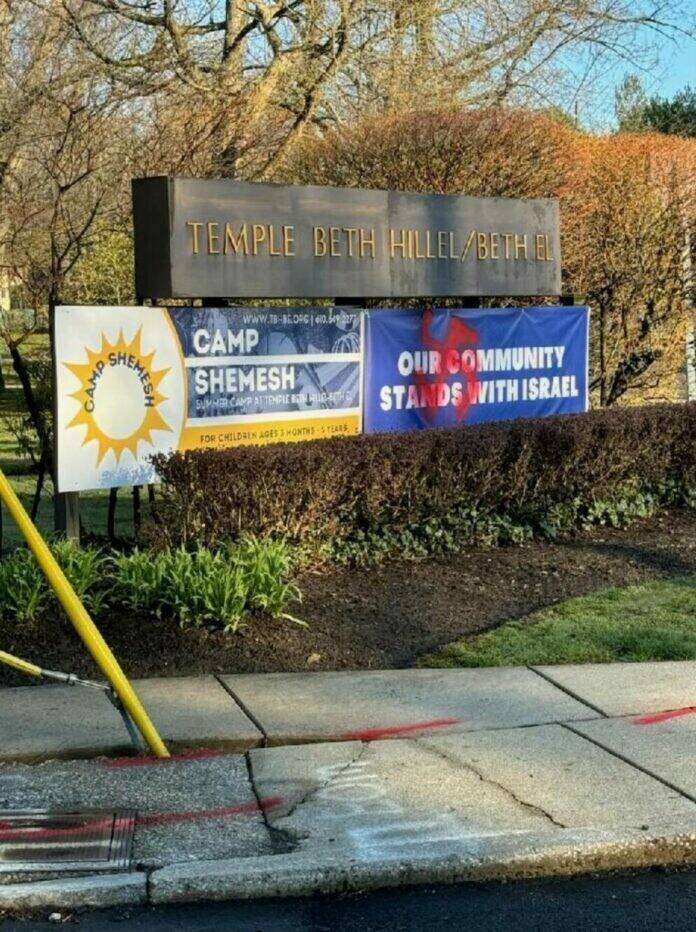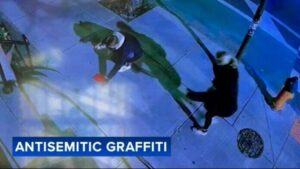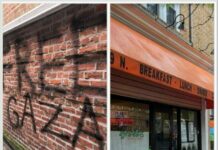
The congregations at Temple Beth Zion-Beth Israel in Philadelphia and Temple Beth Hillel-Beth El in Wynnewood are like many Jewish congregations today. They have security cameras overseeing their properties, guards at their doors and other layers they can’t even discuss.
Yet none of these layers were enough in recent weeks when both communities were vandalized.
On March 24, a swastika was drawn on a pro-Israel banner at the edge of Beth Hillel-Beth El’s property. Four days later, two women used stencils to spray paint “from the river to the sea” on the sidewalk outside BZBI.
The perpetrators have not been caught. Luckily, no one was physically injured. But events like these leave emotional scars.
“I don’t think that antisemitism is something we’re going to eliminate,” said Rabbi Abe Friedman of BZBI.
There is only so much that security layers can do. That’s why, after events like these, the answer may not be another camera or guard, according to leaders at both synagogues.
“I think the best response is one of an openness to the world that shows the beauty and moral conviction of Jewish tradition,” Friedman said.
On April 1, Beth Hillel-Beth El hosted a prayer service in response to the swastika incident. More than 1,200 people attended in person and more than 400 joined online, according to Barbara Bookman, the synagogue’s immediate past president.
The crowd included many congregants and Jews. It also included non-Jewish residents, priests and imams and elected officials.
“The more people realize how they can connect to each other, it helps us see that we’re not different and we’re not the other,” said Bookman. “We see you and you see us, too.”
Anyone who has walked through BZBI’s Center City neighborhood understands that the synagogue is a building on the street. It’s not tucked away. It’s part of the neighborhood.
And in that neighborhood, synagogue leaders and congregants have cultivated relationships, according to Friedman. After the spray-paint incident, the surrounding community’s response was overwhelming. The rabbi estimated that its impact was “10 times” greater than the spray-painting of an anti-Israel message.
An April 2 BZBI Facebook post said that “several local business owners” stepped forward to power wash the spray paint off the sidewalk. They had seen the story on the news.
“It’s good to know these wonderful people are out there, standing with us,” the post said. “It proves that good will always triumph over evil.”
The post has 78 likes and loves.
“We’re going to continue to be open and welcome in people who stop by and say, ‘Oh my gosh, it’s a synagogue. Let me stop in,’” Friedman said.

There has been a cycle with many antisemitic incidents in the Philadelphia area since Oct. 7. Community experiences an incident. Community responds. Local police investigate. Neighbors and public officials show support.
After the swastika was discovered, the Lower Merion Police Department was called, and they responded. Gov. Josh Shapiro, who is Jewish and from Abington, tweeted that, “Antisemitism and the vandalism of a house of worship of any kind have no place in this Commonwealth.”
A similar chain of events happened after someone spray-painted “Free Gaza” outside the Israeli-owned Nana’s Kitchen in Narberth recently. More than 200 Narberth residents attended a main street rally days later. Mayor Andrea Deutsch spoke.
Scott Kerns, the Jewish Federation of Greater Philadelphia’s full-time security executive, explained that security requires a “holistic approach.” Secure the buildings, especially when people are there. Ask the local police department to send extra patrols to check the buildings. Build relationships with neighbors.
“If you see something, say something,” Kerns said.
As the executive explained, security at BZBI and Beth Hillel-Beth El did not stop those perpetrators. But “there was no physical harm,” he said. BZBI was also able to use its cameras to go back and observe the act of vandalism.
There was no camera by the sign at the edge of Beth Hillel-Beth El’s property. But the incident also happened at the edge of the property.
“What I’ve been telling our executives is, the most important thing is the systems you have in place must ensure the safety and security of the congregation when they’re in the building and on the campus,” Kerns said. “No one has 24/7 security. That’s not necessary.”






